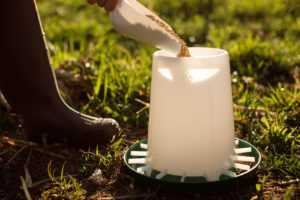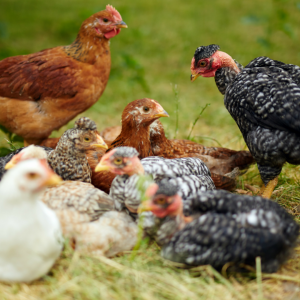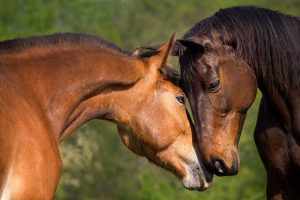 We think about summer feed storage and keeping feed the right way and serving it to your flock in the most efficient way. This can save you time and money. We all know summer brings heat! As well as important considerations when storing poultry and any other pet or livestock feed.
We think about summer feed storage and keeping feed the right way and serving it to your flock in the most efficient way. This can save you time and money. We all know summer brings heat! As well as important considerations when storing poultry and any other pet or livestock feed.
I have likely made all the mistakes that can be made in my poultry keeping days. Hopefully my experience can help some of you be the best livestock keepers you can be.
When I buy a bag of feed and bring it home, I pour it slowly into a metal storage container in my feed room. I use this same storage method all year long, to ensure consistency and quality in what I am feeding. Kissimmee Valley Feed has a hanging metal storage container in stock.
My feed room maintains a nice, cool temperature. A large magnolia tree shades it. It protects my barn from the sun and elements. I only buy one bag at a time, maybe two if it’s on sale, because my bin perfectly fits two 50 lb. bags. Once my feed is in the bin, I use a basic 4 quart feed scoop to fill my feeders.
I keep two 5 lb. feeders for 15 birds. I keep them full most of the time since my schedule doesn’t allow me to monitor them at all times. If you choose to fill up your feeders to free feed, I would recommend putting them up in the evenings (in a metal storage container) and putting them back out in the morning.
This will keep pests away. I also always check the age of the feed I buy to make sure it’s not out of date and free of pests. I let my birds empty their feeders before I refill them, no room for pickiness here!
Keep in mind my birds also get treats and free range during the day so they get plenty to eat. Shop local with us and check out Kissimmee Valley Feed’s poultry selection here!
There are three main points to address when considering feed storage and containers.
1. Environment
Feed kept in the hot sun and dry conditions will get overly dry and lose palatability. Feed stored in hot, humid conditions can mold and be prone to insects. Keep feed in a container that stays out of the elements and is in a dry, cool location.
If the feed that’s already in the feeder gets wet or starts to age, dump it out and start fresh (maybe with a little less this time). Allow the birds to completely empty the feeder before you refill it so it’s always free of build-up and mold.
Mold can make your birds sick in large amounts. Once in a while its best to check and wash out your feeders. Yes, even if they haven’t been exposed to extreme elements.
2. Pests
Pests can be attracted any time feed is old, has gotten hot, moist or been left exposed. These can include various types of bugs that will get into and feed on the product.
It also includes rodents and other small animals that would enjoy a free snack. Storing feed in a rodent safe container is my personal recommendation. Preferably a metal bin that has a tight fitting lid. The metal will keep small rodents like mice and rats from chewing through and getting into your feed bin.
A tight fitting lid will also keep larger pests like raccoons and opossum from pulling the lid open and helping themselves to an easy meal. If you keep feed in a feeder all the time it’s always best practice to put your feed containers up in a bin at night and pull them back out in the morning.
If moving the feeder is not an option, then you may look into getting a feeder that opens when the chickens step on a pedal and closes back when they step away. Typically mice are going to be too light to open up these types of feeders.
3. Age of feed/rotation
When buying from a feed store or even when you keep multiple bags of feed on hand, it’s always best to check and make sure you are buying/using the oldest feed first.
Somewhere on the feed tag there should be dates (typically a manufacture date) letting you know when it was made.
Using the oldest feed first ensures that you always have the freshest feed on hand.
With these considerations, you are sure to keep you and your feathered friends happy and healthy!
Source: https://www.scoopfromthecoop.com/
 Head on over to Kissimmee Valley Feed Store #2 to take advantage of these August Astro Sales. Savings valid at our 215 13th Street St. Cloud, FL 34769. Stock up and save today! Please note the varying expiration dates.
Head on over to Kissimmee Valley Feed Store #2 to take advantage of these August Astro Sales. Savings valid at our 215 13th Street St. Cloud, FL 34769. Stock up and save today! Please note the varying expiration dates.




 Wondering when it’s time to begin transitioning chickens to layer feed? For backyard chickens, most egg-laying breeds reach adulthood at 18 weeks and lay their first egg— perfect timing when you can start your chickens on layer feed.
Wondering when it’s time to begin transitioning chickens to layer feed? For backyard chickens, most egg-laying breeds reach adulthood at 18 weeks and lay their first egg— perfect timing when you can start your chickens on layer feed. Buy 2 get 1 free on all
Buy 2 get 1 free on all  We think about summer feed storage and keeping feed the right way and serving it to your flock in the most efficient way. This can save you time and money. We all know summer brings heat! As well as important considerations when storing poultry and any other pet or livestock feed.
We think about summer feed storage and keeping feed the right way and serving it to your flock in the most efficient way. This can save you time and money. We all know summer brings heat! As well as important considerations when storing poultry and any other pet or livestock feed. Beat the heat with our 10% off coolers sale! Offer is valid at Kissimmee Valley Feed Store #2 at 215 13th Street St. Cloud, FL 34769 only. We carry coolers as well as cups, tumblers, accessories, apparel, and even more!
Beat the heat with our 10% off coolers sale! Offer is valid at Kissimmee Valley Feed Store #2 at 215 13th Street St. Cloud, FL 34769 only. We carry coolers as well as cups, tumblers, accessories, apparel, and even more!